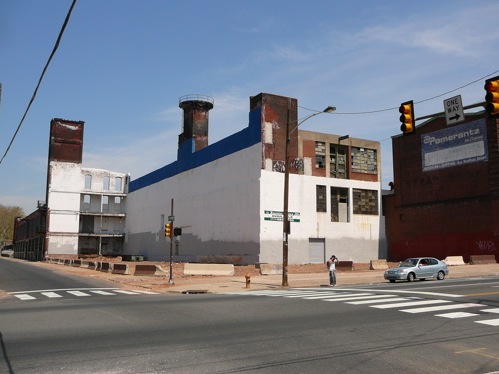
Northeast corner Allegheny Avenue & C Street (2007).
Pennsylvania Woven Carpet Mills, 1899
401 East Allegheny Avenue, Philadelphia PA 19134
© Carmen A. Weber, Irving Kosmin, and
Muriel Kirkpatrick, Workshop of the World (Oliver Evans
Press, 1990).
The four story brick building on the
corner of East Allegheny Avenue and C Street was occupied
in 1899 by Thomas Halton and Sons, who used the first
floor as a machine shop. Tenants on the second and third
floors produced upholstery goods and hosiery. In 1916,
the building was purchased by the Doerr family, who had
operated the Philadelphia Carpet Company at their Lower
Kensington mill at 5th Street and Columbia Avenue. The
company began in 1846 as many Kensington textile concerns
started, with Peter Doerr renting handloooms to weavers
to use in their homes and providing the wool to make
carpets. The first Doerr mill, constructed in 1870,
utilized steam powered looms to produce ingrain carpets.
The company's move north to the East Allegheny Avenue
mill was also duplicated among many other Kensington
textile firms. The Philadelphia Carpet Company made
narrow and broadloom velvet carpets at the East Allegheny
mill.
Whereas the corner building holds offices and looms,
another two story brick building connected to the rear in
1899 housed the finishing department. In 1937 a more
modern mill was built to the east of the original
building. This building housed Wilton looms, capable of
making carpet up to 15 feet wide.
The Philadelphia Carpet Company continued operations at
Allegheny Avenue and C Street until 1976. During World
War II, the company, along with many other textile firms
in Kensington, participated in the war effort by
producing cotton duck and tarpaulins. In the 1970s
several concerns ran the mills, such as Shaw Industries,
a local business group. In 1987 Frank J. Pisano
refurbished the mill, naming it Pennsylvania Woven Carpet
Mills, Inc.
The mill now is one of the largest producers of Wilton
carpet in the United States. Custom carpets, in widths of
27 inches to 12 feet, are produced in 100% wool as well
as in wool/nylon and acrylic/nylon blends. Customers
include airlines, hotels, casinos, restaurants, banks,
and many others; a Pennsylvania Woven carpet even sits on
the floor of the original Senate Chambers in the
U.S. Capitol in Washington, D.C. 1
1 Conversation with Salvatore
DeGrazio, Director of Style & Design, and William
Schol, Mill Superintendent, (January 12, 1989)
Update May
2007 (by Torben
Jenk):
Demolished. Other
buildings remain on this block and south across Lehigh
Avenue.
See
also:
Members Linger
at Last Carpet Mill—a Tour of the Pennsylvania
Woven Carpet Mills in 1990, Irv Kosmin, (The Wright
Stuff, Newsletter of the Oliver Evans Chapter of the
Society for Industrial Archeology, January 1991),
p.10.